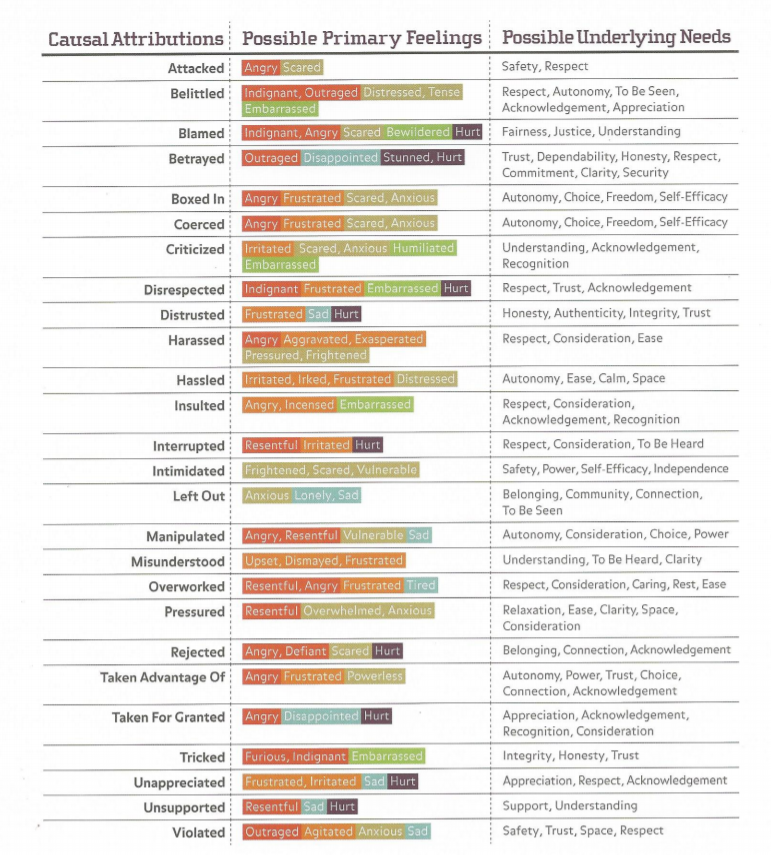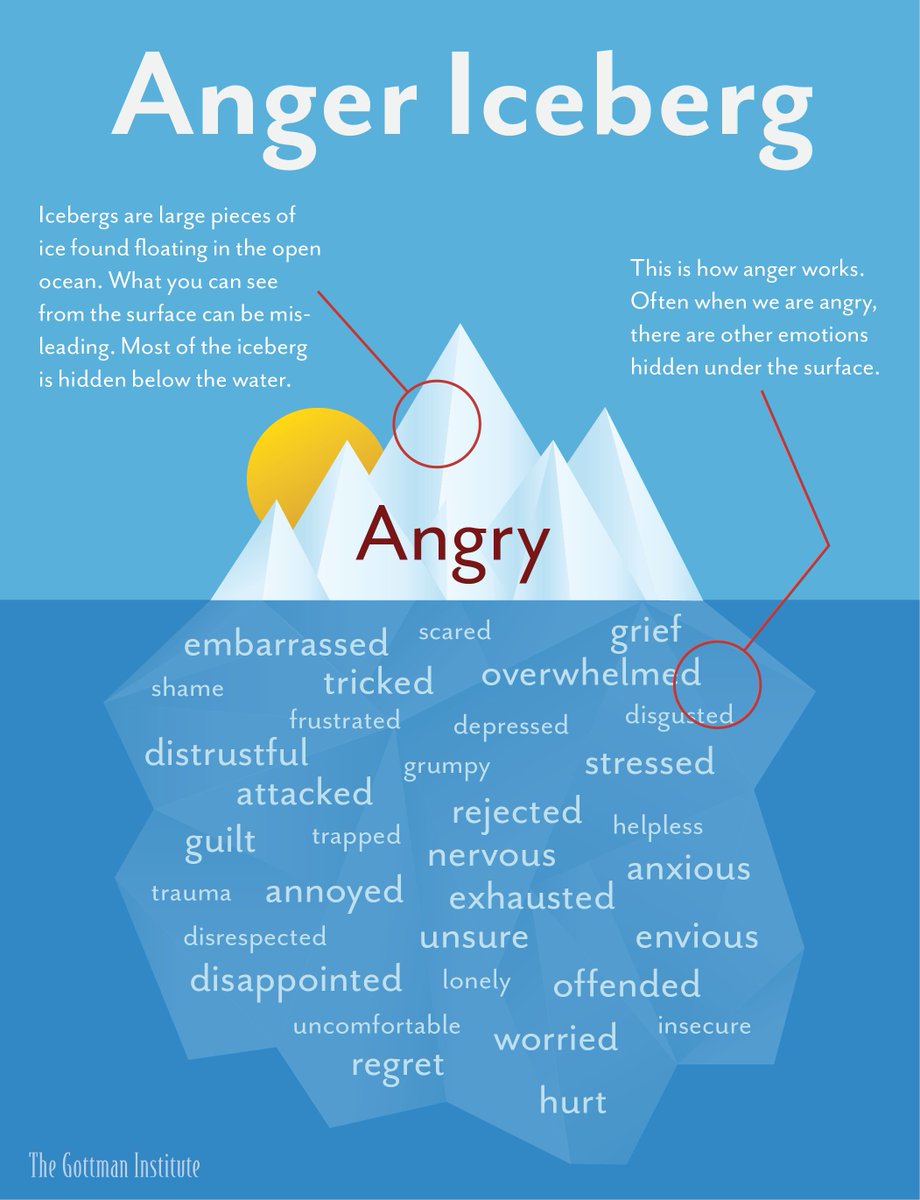For everyone saying there are "better ways to protest" or that "there& #39;s no call for this type of violence" or that people should "put this energy into voting instead"--
I& #39;m a mental health counselor. And I& #39;d like to talk about anger.
[A thread]
I& #39;m a mental health counselor. And I& #39;d like to talk about anger.
[A thread]
First, I have worked with many angry people. I& #39;ve worked with offenders of violence who blame anger for the harm they& #39;ve caused others. I& #39;ve worked with victims who feel they will never heal from anger towards their abusers. Anger is insidious & painful. Anger is also essential.
"Anger usually appears in camouflage under definitions such as aggression, violence, and hostility, or else is referred to almost casually... as though it is too simplistic for consideration." (Danesh, 1977)
Screw that. We& #39;re gonna talk about it. Here are some important points.
Screw that. We& #39;re gonna talk about it. Here are some important points.
1. Anger is a natural human response.
"Anger is a natural reaction to almost any real or presumed attack, hurt or threat." (Vitz, 2008) https://doi.org/10.1007/s10943-018-0574-6">https://doi.org/10.1007/s...
Anger is what tells us we are unsafe, unheard, disrespected, or that our boundaries have been crossed.
"Anger is a natural reaction to almost any real or presumed attack, hurt or threat." (Vitz, 2008) https://doi.org/10.1007/s10943-018-0574-6">https://doi.org/10.1007/s...
Anger is what tells us we are unsafe, unheard, disrespected, or that our boundaries have been crossed.
Oftentimes we blame people for getting angry but anger is a natural and NECESSARY emotion. We get angry and we should get angry.
If someone shoves me, I should get mad. If someone keeps shoving me, I should get furious. Anger is what tells us our safety is being threatened.
If someone shoves me, I should get mad. If someone keeps shoving me, I should get furious. Anger is what tells us our safety is being threatened.
This is one of my favorite resources (from the Center for School Transformation). Our emotional reactions stem from our needs being directly violated or neglected. Our emotions have purpose and need to be listened to.
2. Anger is a secondary feeling.
We don& #39;t get mad first. Anger is the result of many other feelings being ignored or neglected, which rises into anger.
The Anger Iceberg illustrates this. Underneath anger is a host of other feelings, all informing anger.
We don& #39;t get mad first. Anger is the result of many other feelings being ignored or neglected, which rises into anger.
The Anger Iceberg illustrates this. Underneath anger is a host of other feelings, all informing anger.
If someone shoves me, maybe I& #39;m confused or surprised first. If they shove me again, maybe I feel hurt, disrespected, or rejected. If they shove me a third time, maybe I start to feel trapped or helpless.
Any of these can inform anger, but anger never comes first.
Any of these can inform anger, but anger never comes first.
If you find yourself getting caught at the surface, look under the water.
Consider what& #39;s underneath the anger.
Consider what you, yes you, have done or haven& #39;t done to address that pain and hurt in your lifetime.
Then do something about it.
Consider what& #39;s underneath the anger.
Consider what you, yes you, have done or haven& #39;t done to address that pain and hurt in your lifetime.
Then do something about it.
3. We can manage anger, yes, but to a degree.
Teaching coping skills is a huge part of mental health care, and coping skills help us manage our feelings. But we cannot (and should not) manage anger that arises in a response to our safety being threatened.
Teaching coping skills is a huge part of mental health care, and coping skills help us manage our feelings. But we cannot (and should not) manage anger that arises in a response to our safety being threatened.
This is because when our safety is threatened, our amygdala releases stress hormones (namely cortisol and adrenaline) that trigger our fight/flight/freeze response. Our decision-making centers shut down and we rely on survival strategies.
If someone keeps shoving me, eventually I& #39;m going to feel a threat for my life, and I& #39;m going to do what I need to survive.
Anger management isn& #39;t a question anymore-- it& #39;s about doing whatever& #39;s necessary to get out alive.
Anger management isn& #39;t a question anymore-- it& #39;s about doing whatever& #39;s necessary to get out alive.
Additionally, this stress-response is more sensitive for people who have experienced this before. So if I have a lifetime of being shoved, then I& #39;m likely to revert to fight/flight/freeze much quicker.
(For more, I recommend The Body Keeps the Score by Bessel van der Kolk.)
(For more, I recommend The Body Keeps the Score by Bessel van der Kolk.)
Also, if you think the protesters haven& #39;t been managing their anger-- you haven& #39;t been paying attention. We are looking at GENERATIONS of patient protests that haven& #39;t been heard.
I can ask someone to stop shoving me. I can ask it a hundred times.
But if they keep shoving despite every time I ask, eventually, I& #39;m gonna fight back. As I damn well should.
But if they keep shoving despite every time I ask, eventually, I& #39;m gonna fight back. As I damn well should.
4. Anger is only absolved by addressing the underlying root.
Putting out fires does not work for anger. The anger will flare up again in a new and different way-- as it should. Anger is our signal that something is wrong. It won& #39;t stop until that something is fixed.
Putting out fires does not work for anger. The anger will flare up again in a new and different way-- as it should. Anger is our signal that something is wrong. It won& #39;t stop until that something is fixed.
I am not excusing acts of violence out of anger. We are all accountable for our actions.
I am saying that after generations of ignoring pain and anger, what the else should we expect? Where else can that anger go?
I am saying that after generations of ignoring pain and anger, what the else should we expect? Where else can that anger go?
Anger hurts. It hurts to hold and hurts to receive. But it will keep hurting unless we dig underneath it and address whatever is causing the pain. Unless we heal the hurt from within.
I& #39;ll be angry until they stop shoving me. Until they apologize. Until no one is shoved again
I& #39;ll be angry until they stop shoving me. Until they apologize. Until no one is shoved again
5. We can heal from anger.
It& #39;s okay for us to get angry, even with people we love. Anger shows we care, shows we want to be connected, shows we want something better.
Anger is not a conclusion. It is the start of a conversation.
It& #39;s okay for us to get angry, even with people we love. Anger shows we care, shows we want to be connected, shows we want something better.
Anger is not a conclusion. It is the start of a conversation.
And for anger to turn into a conversation, the response needs to be empathy.
Empathy isn& #39;t just sympathizing or listening sadly. It means building a direct partnership between yourself and the person in front of you and working with them to make a change.
Empathy isn& #39;t just sympathizing or listening sadly. It means building a direct partnership between yourself and the person in front of you and working with them to make a change.
We can heal from this anger, but only by addressing the root. Only by understanding the underneath, by facing the why questions.
Only by being willing to change.
Otherwise the anger goes ignored again and we wait, fractured, for the anger to boil over again.
Only by being willing to change.
Otherwise the anger goes ignored again and we wait, fractured, for the anger to boil over again.
In Pedagogy of the Oppressed, Freire (1970) defined praxis as "reflection and action directed at the structures to be transformed." This is empathy. We don& #39;t just listen, we join. We don& #39;t just act, we consider our actions.
This is how we should respond to anger. This is change.
This is how we should respond to anger. This is change.
I can be incredibly long-winded, so thanks to everyone who stuck with me for this.
If this thread raised more questions for you, here’s a fabulous resource bank. Remember, it’s on us to educate ourselves, not ask to be educated.
https://twitter.com/lynn__burnett/status/1266948414907928578?s=21">https://twitter.com/lynn__bur... https://twitter.com/lynn__burnett/status/1266948414907928578">https://twitter.com/lynn__bur...
If this thread raised more questions for you, here’s a fabulous resource bank. Remember, it’s on us to educate ourselves, not ask to be educated.
https://twitter.com/lynn__burnett/status/1266948414907928578?s=21">https://twitter.com/lynn__bur... https://twitter.com/lynn__burnett/status/1266948414907928578">https://twitter.com/lynn__bur...

 Read on Twitter
Read on Twitter



